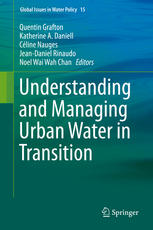

Most ebook files are in PDF format, so you can easily read them using various software such as Foxit Reader or directly on the Google Chrome browser.
Some ebook files are released by publishers in other formats such as .awz, .mobi, .epub, .fb2, etc. You may need to install specific software to read these formats on mobile/PC, such as Calibre.
Please read the tutorial at this link: https://ebookbell.com/faq
We offer FREE conversion to the popular formats you request; however, this may take some time. Therefore, right after payment, please email us, and we will try to provide the service as quickly as possible.
For some exceptional file formats or broken links (if any), please refrain from opening any disputes. Instead, email us first, and we will try to assist within a maximum of 6 hours.
EbookBell Team

0.0
0 reviewsThis book examines changes and transitions in the way water is managed in urban environments. This book originated from a joint French-Australian initiative on water and land management held in Montpellier, France. The book delivers practical insights into urban water management. It links scientific insights of researchers with the practical experiences of urban water practitioners to understand and respond to key trends in how urban water is supplied, treated and consumed. The 51 contributors to the volume provide a range of insights, case studies, summaries and analyses of urban water and from a global perspective. The first section on water supply and sanitation includes case studies from Zimbabwe, France and South Africa, among others. Water demand and water economics are addressed in the second section of the book, with chapters on long-term water demand forecasting, the social determinants of water consumption in Australian cities, a study of water quality and consumption in France, governance and regulation of the urban water sector and more. The third section explores water governance and integrated management, with chapters on water management in Quebec, in the Rotterdam-Rijnmond urban area, in Singapore and in Australia. The final section offers perspectives on challenges and future uncertainties for urban water systems in transition. Collectively, the diverse insights provide an important step forward in response to the challenges of sustainably delivering water safely, efficiently and equitably.